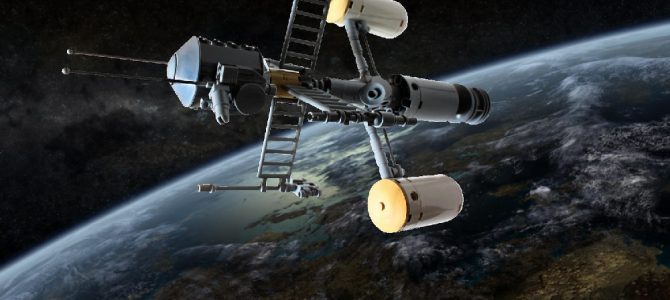
Since Donald Trump became president in January there has been much speculation about his future space policy. Will he declare the moon his goal, and task NASA to take astronauts there? Or will he aim higher, doubling down on the push for Mars that NASA has been selling for the past six years? Or will he leave the exploration to private companies and citizens while squeezing NASA’s budget into irrelevancy?
None of these choices are actually good ones. All repeat presidents’ failures since the 1960s to accomplish anything very striking in space. Since John F. Kennedy, subsequent presidents from Nixon to Reagan to Bush to Clinton to Bush to Obama have all copied Kennedy, making a Kennedy-like space speech that committed the nation to some wonderful space goal by some significant date.
None of those commitments have been met. Some never even happened. Instead, all we have done since the Apollo program is go around in circles, spending gobs of taxpayer money without getting much of anything for it.
If Trump wants to truly lead the United States and world into the exploration and settlement of the solar system, he needs to do something different and game-changing. He also needs to shift the federal government’s focus away from building spaceships and rockets and towards its much more basic legal responsibilities, especially when its citizens wish to establish their mark in new territories.
Announcing: The Spacestead Act
Trump should propose a system that would allow the nations of the world to claim territory in space. Only by doing that will colonization and settlement of the solar system be finally possible.
To do this will involve renegotiating or repealing the United Nations Outer Space Treaty, first passed in 1967. While that treaty has many good features, such as making nations liable for any damage caused by any object they launch, its fundamental purpose has been to forbid any nation from claiming sovereignty on any territory in space, a restriction that has been increasingly recognized as a fundamental obstacle to settling the solar system.
For example, the United Kingdom, Luxembourg, Japan, and the United Arab Emirates (UAE) have all been recently reviewing their laws in an effort to promote the development of space. Some (Japan, Luxembourg, and the UK) have made proposals, but each has been limited by the restrictions of the Outer Space Treaty and have dealt only with Earthbound regulatory and liability issues.
Of these nations, Luxembourg—one the world’s biggest investors in private enterprise in space—has made the most effort to overcome the Outer Space Treaty. To encourage asteroid mining by private Luxembourg firms, they have proposed having their laws apply to the resources mined, not the territories themselves. As a result, the proposed law is very complex (thus raising development costs for private companies) while requiring a large bureaucracy. More importantly, it does nothing to legally protect the ownership of actual in situ space-mining operations. The Outer Space Treaty does not allow that.
Settle Space Like We Settled The West
These nations are actually late-comers to this issue. In the United States, Congress has been trying for decades to come up with a regulatory framework allowing for private development in space while still adhering to the Outer Space Treaty. All of these efforts have failed. Private enterprise in space is simply impossible under the UN treaty, since any private investment by individuals or companies remains exposed and unprotected legally.
Yet it is a government’s fundamental job to establish an overall legal framework for its citizens. This is what the U.S. government did so well when the nation was forging westward and establishing new territories beyond the Mississippi River. Except for several relatively simple efforts like the Lewis and Clark expedition, the government never mounted a big government program to settle the west. Instead, it laid out the legal framework and territories under which the American population could do the settling, and then got out of the way.
So what should Trump do? At this moment he has a wonderful opportunity to put his stamp on the future, and steer the entire human race to the stars. Trump should propose a new Outer Space Treaty, superseding the old, that would let nations plant their flags in space. This new treaty should establish the rules by which individual nations can claim territory and establish their law and sovereignty on other worlds or asteroids.
The American homesteading acts of the 1800s could work as a good guide. Under those laws, if an American citizen staked a claim and maintained and developed it for five years, that claim and an accompanying amount of acreage would then become theirs.
In space, Trump could propose that in order for a nation to make a territorial claim, a nation or its citizens must establish a facility. If they occupy and use it for a minimum of five years, that nation can claim it, plus a reasonable amount of territory around it, and place it under that nation’s sovereignty.
This Will Require Negotiation and Testing
Obviously this new Outer Space Treaty will require negotiation. For example, how much territory should each claim allow a nation to possess? One hundred square meters? A thousand? Ten thousand? Such a number must be determined by negotiation between the nations involved.
Similarly, what claims should the United States have on the landing sites it has already established on the moon and Mars? Does the United States already own the Apollo sites? Shall the United States claim all the territories its Martian rovers have travelled? Such questions will need discussion and negotiation.
Once such a system is in place, however, it will be possible for the United States, Luxembourg, Japan, the United Kingdom, and all other spacefaring countries to establish their legal systems on any territory in space they successfully claim. Private efforts by either individuals or companies within those territories will then have a framework under which they can protect their capital investments and property as they work to profit from their efforts.
Under this context, Trump should also push for a new American law that would apply to any American private effort in space. Once again, the homesteading acts can form a good framework. Under a new American homesteading act for space, American citizens could claim ownership of any real estate in space under U.S. jurisdiction, after they have established and maintained a claim on it for a period of years.
The size of territory private citizens claim should reflect their needs, as did the homestead acts of the 1800s. In the west it was found that 160 acres was sufficient for farmland, but desert claims needed to be larger, 640 acres, for farmers to succeed on them.
In space we do not yet know the right size for a self-sufficient homestead claim. Too small, and the homestead will not be viable. Too large, and we leave no more room for later settlers. As a start we could begin with 250 hectares, which is comparable to 640 acres, and adjust later with experience. Other nations could do some variation of the same, following their own national and cultural dictates.
What We Get Out of This
Such an international and national framework would serve many laudable purposes. It would encourage competition and exploration, as every nation and person in the world would have an incentive to get there first to stake their claim.
More importantly, it would provide a peaceful framework for every nation to settle and gain territory in space. Military conflict would be made irrelevant. You get there and build your base or colony, and the territory would be recognized as yours, by every nation on Earth. No need to use force to establish control. The law would do it for you.
Finally, this framework would allow for nations that believe in freedom and private property to establish their laws in space. Freedom and the American Constitution will be given an outlet throughout the solar system. Based on the success that system had in building the United States, this can only lead to good things.
President Trump has an opportunity now to change the nature of space exploration. To do so he needs to act boldly, and make fundamental political changes to the way the international community has been exploring space for the past half century. Having the government try to build the ships and rockets has not worked. Instead, we need the government to do its real job—establishing law—while leaving the shipbuilding and profit-making to the citizens themselves.
If Trump does this, the future will be bright and exciting. If he doesn’t, space exploration will continue to drift.








